
Quick access
AGENDA
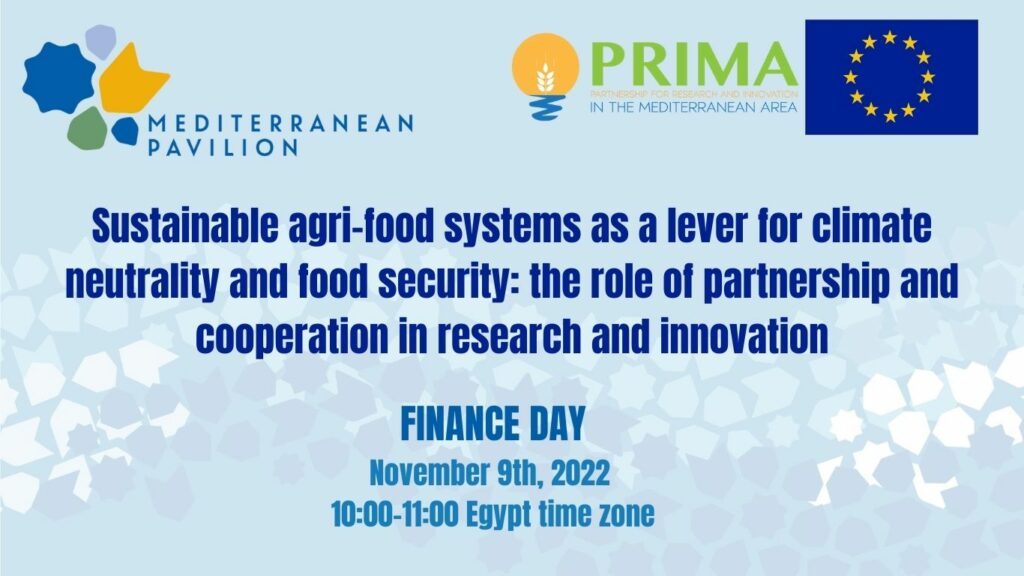
Lead organisation – PRIMA
Type of event – Hybrid panel debate
Background – Food systems are central to the global economic and social debate. This is due to their impact on climate change and biodiversity loss, the economic, social, and cultural importance of the sector, and the effects of nutrition on the well-being and health of individuals and societies. In addition, the relevance of food security in all countries has become an urgent priority. Last year’s Food System Summit testifies to this relevance and today’s challenges confirm the need for action in both the short and long term. The war in Ukraine and the subsequent spike in food prices are turning this situation into a dramatic international food crisis. Ukraine and Russia contribute 30% of the world wheat market, 55% of the sunflower oil market and high percentages of other key food products. Russia is one of the world’s leading exporters of fertilizers, while wheat is a key food for 35% of the world’s population and 26 countries for more than 50%. Moreover, food systems transversally affect the SDGs, impacting seemingly distant goals such as zero poverty, good health, or climate action.
Recent IPCC Assessment Reports highlight the vulnerability of global food systems to climate change and the negative consequences of climate extremes on food security. Crop yields are being compromised by surface ozone, methane emissions, warmer and drier conditions are increasing tree mortality, desertification, soil erosion, ocean warming, and acidification are decreasing fishing activity yields. Moreover, higher temperatures will spread toxigenic fungi, plant and animal-based pathogens, and harmful algal blooms. Similarly, more frequent flood events will increase food contamination, considerably affecting human health. Moreover, environmental degradation hinders the access to nutritious food and increases the risks of the emergence of climate-driven zoonoses. Moreover, climate extremes negatively affect economic prosperity and food accessibility, particularly among the most vulnerable groups such as women, children, and the elderly. All these complexities and challenges are even more severe in the Mediterranean region, which is a hot spot for climate change and whose Countries are highly dependent on the import of wheat.
Nonetheless, food systems are key elements not just in the problem but also as a driver for a solution. Innovation and the uptake of adaptation strategies available to food systems will be a fundamental step in mitigating climate change, given the considerable role that such systems play in environmental degradation. Food systems are responsible for one-third of global GHG emissions, biodiversity loss and global water footprint. This is due to the production of food commodities, their processing, distribution, and the management of the system’s waste. In addition, food systems are also highly inequitable, with 10% of the global population still facing hunger and 65% of people under the poverty threshold working in the agricultural sector.
In this regard, research and innovation are indispensable factors in addressing the food emergency in the Mediterranean area and increasing agricultural production sustainably, optimizing water, soil, energy, fertilizers and other inputs. Cooperation and partnerships in enhancing and implementing similar R&I solutions are pivotal, and no solution or deterrence of climate change can be achieved without the complete commitment of all stakeholders comprising food systems.
Session coordinator – Angelo Riccaboni and Giovanni Stanghellini
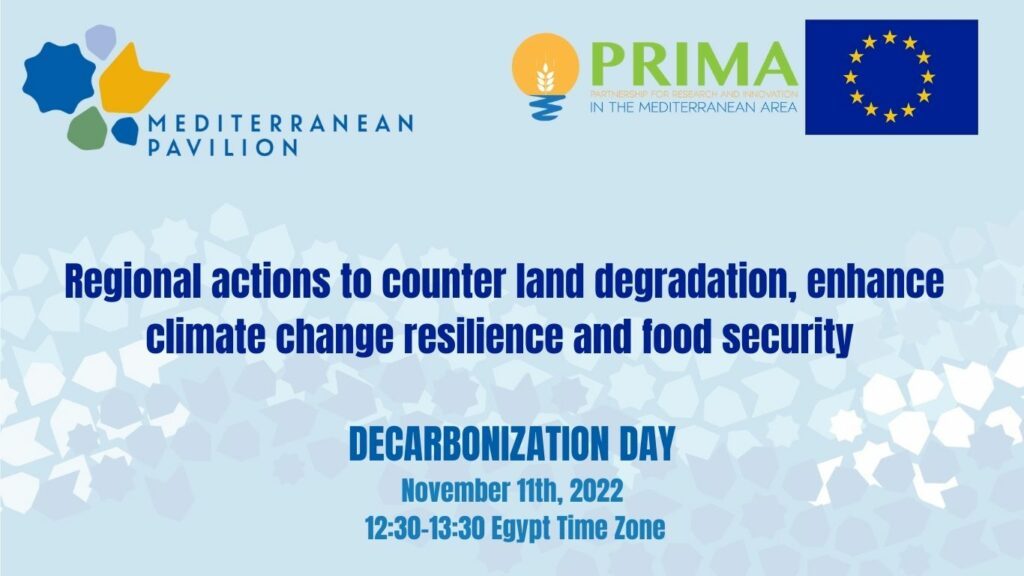
Lead organisation – PRIMA
Type of event – Hybrid panel debate
Background
In the context of COP 27, PRIMA, UfM, FAO, and CIHEAM are jointly organising a side event entitled “Regional actions to counter land degradation, enhance climate change resilience and food security”, which will represent an opportunity for participating entities to raise awareness of solutions and funding opportunities for sustainable land management (SLM), as well as to map out regional actions to counter land degradation and desertification in the Mediterranean Region.
As recalled in the conclusions of the UNCCD COP15 and at the UN Food Systems Summit, reducing desertification risks while increasing food security, improving livelihoods and increasing natural and climate resilience requires immediate action, investments and wide stakeholder involvement. This is true for the Mediterranean region, where SLM and restoration are key to generating positive socio-economic impacts.
In this event, PRIMA projects will outline how deploying innovative solutions and SLM in Mediterranean demo areas can help prevent desertification and restore drylands.
These projects will contribute, at the technical level, to the objectives of the LANDMEDNET Initiative, aiming to promote concerted regional efforts to address land degradation and climate change and, at the political level, they will support the UfM 2030 GreenerMed agenda, aiming to provide a regional framework that creates policy and operational convergence around the three priority axes of cooperation agreed by the 42 UfM countries.
Event objectives
The event aims to:
- Recognise the importance of SLM measures and practices, including NBS, to combat desertification, whilst capturing what works well for replication and scaling up;
- Link with the transition towards sustainable food systems;
- Highlight gaps and challenges that hinder SLM and incorporate traditional knowledge and perspectives, along with gender and youth considerations in policy measures;
- Explore funding opportunities by maximising partnerships with regional partners and financial institutions
Session coordinators – Antonella Autino and Marco Orlando, PRIMA
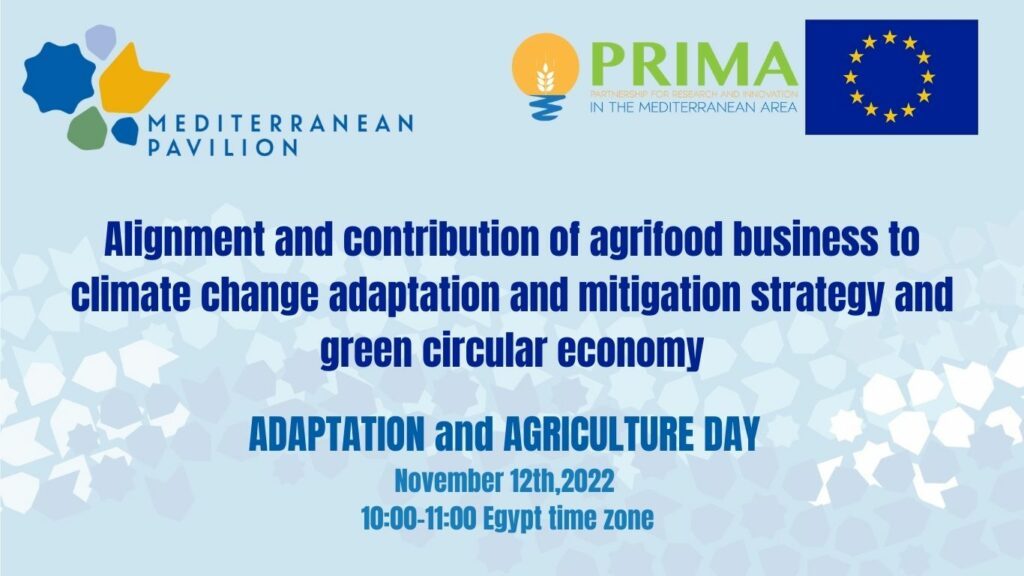
Lead organisation – PRIMA
Type of event: Hybrid Panel debate
Background –
Concept – Agri-food systems are at the centre of the global debate on sustainable development, for their impact on climate change, CO2 emissions and biodiversity loss, for the importance that food security is assumed worldwide, for the spread of obesity and malnutrition, and the effects of it on the well-being and health of individuals and societies. The recent geopolitical crisis in Ukraine confirms this sector’s relevance from an economic, social, humanitarian and strategic standpoint.
In the path towards more sustainable agrifood systems, companies can play a central role, adopting production and distribution models that are more attentive to environmental resources and social equity and promoting dietary patterns in line with sustainable diets. The Mediterranean and the MED diet constitute a case in point where it would be interesting to engage with the smallholders and companies to call upon them to take responsibility for adopting more sustainable institutional, economic, social and environmental practices. If there is no doubt that companies’ behaviour might have negatively impacted some of the current problems, the same sector can also be part of the solution.
This evolution, as it can benefit the environment and society, could also benefit the companies themselves in terms of new market opportunities, financial resources, and better relations with stakeholders and regulators. Large companies have already grasped the importance of this evolution. On the other hand, smaller companies are less committed to this process, with the risk of losing market opportunities and competitiveness. At the same time, precisely the smallholders and small companies are the backbones of the productivity system of several Mediterranean Countries and economies. To avoid sustainability being seen as a burden, instead of an opportunity, it is necessary to start with the promotion of the grammar of sustainability in smaller companies. That is to make them understand what sustainability means for agrifood companies, how to introduce it into operational activities, how to monitor it and how to communicate it.
The establishment of accounting and sustainability reporting mechanisms, meant to assess the alignment of companies’ practices to SDGs and related targets, has played a positive role in pushing companies to improve their behaviours, also triggering sustainable investments for economic growth. Perceptions around sustainability performance measurement and reporting have also evolved significantly. While this type of performance was considered not very common years ago, today, the alignment to sustainability is an act of leadership and expected conduct.
The current debate around food systems has clearly shown that the global objective cannot be achieved independently of the different local contexts where citizens, businesses and consumers live. In particular, the G20 Agriculture Communique has clearly stated that there is no one size fits all strategy to promote sustainable food systems. On the contrary, the appropriate implementation of the strategy shall also bear in mind and adequately valorize the cultural, traditional, and historical elements. Therefore, the issue of how to assess business practices becomes crucial for the future of the food sector.
The seminar will investigate the models and systems to measure the impact of agrifood production on the environment and on nutrition, taking into consideration the risks that inadequate measurement systems can endanger traditional Mediterranean production and value chains.
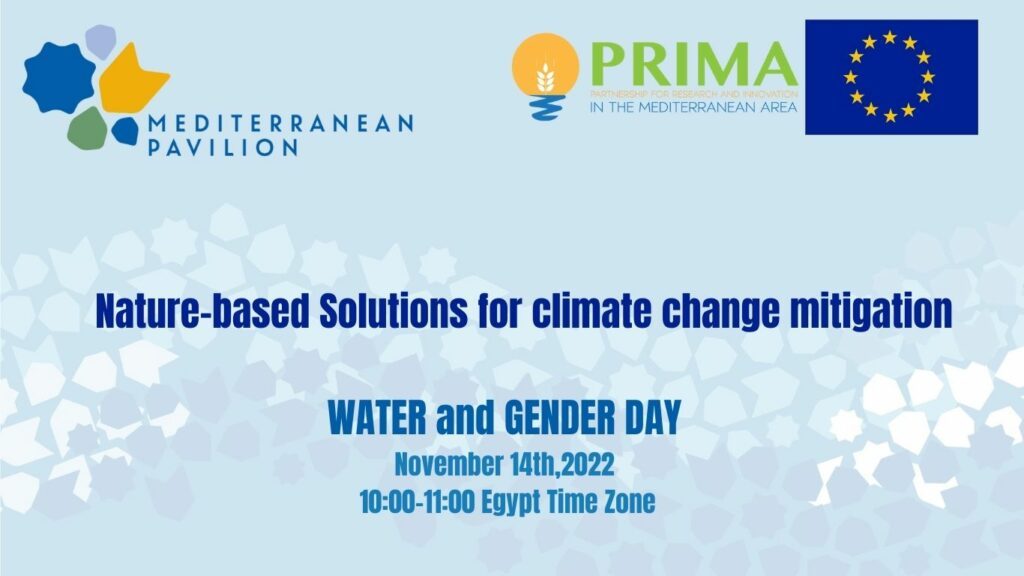
Lead organisation – PRIMA
Type of event- Hybrid panel debate
The European Strategy on Adaptation to Climate Change strongly embed Nature-based (NbS) components as positive and cost-efficient ways of supporting ecosystem-based disaster risk reduction and adaptation to climate change. These nature-based components are embedded in UfM Ministerial Declarations on Environment and Climate Action and the Sustainable Blue Economy at the Mediterranean level. Several initiatives have made NbS a priority within the Mediterranean region, including PRIMA, UfM, FAO, Interreg NEXT MED, EFI, MEDWET and many more. This session will focus on three urgent and essential Nature-based Solutions to the Mediterranean region’s most pressing challenges – wetlands; agroecology; marine and coastal protected areas – based on solid experience and cooperation.
Background
Nature-based Solutions (NbS)[1] promoting the use of ecosystem services through conservation or restoration interventions are key to addressing global societal challenges, such as climate change, environmental degradation, and natural disaster risk reduction. Harnessing natural capital by adopting nature-based solutions – in contrast to conventional engineered solutions – can help tackle these challenges contributing to the UN 2030 Agenda. This session will focus on the following Nature-based Solutions:
Wetland (natural and constructed)
Wetlands are some of the world’s most biologically diverse and productive natural ecosystems, vital habitats for wildlife and essential for water regulation and carbon storage.
Despite their vital roles, wetlands are among the most vulnerable ecosystems, with up to 48% of Mediterranean wetlands lost since 1970. The effects of climate change, population growth and increasing economic development are expected to exacerbate the loss and degradation of many wetlands and their associated species. There is an urgent need to conserve and restore the natural wetlands and promote the establishment of newly constructed wetlands to maximise the ecosystem services these areas provide as an eco-friendly, cost-effective and technically feasible approach.
Agroecology as nature-based solutions: The Mediterranean region holds over 80 million hectares of degraded land. Effective joint mitigation and adaptation approaches are critical to achieving climate and restoration goals in the Mediterranean region. PRIMA nature-based solutions (NbS) enhance the resilience of ecosystems to climate change and help accelerate the transition toward more sustainable food and systems through agroecological measures. The PRIMA projects integrate these approaches in different agro-systems by promoting polycultures, agroforestry, and crop-livestock mixed systems.
Marine and Coastal Protected Areas:
The Mediterranean coastal ecosystems are under wide and intensive pressure. While the most populated areas in the Mediterranean region, marine and coastal areas are threatened by increased sea levels and erosion.
At the UNFCCC COP 26, Governments recognised the need for cross-cutting incorporation of the ocean under the work of all relevant constituted bodies and workstreams. The Union for the Mediterranean Climate Change Adaptation Framework, Ministerial Declarations on Environment (Athens, 2014) and Blue Economy (Brussels, 2015) recognise strong links between the marine ecosystem and climate change concerns.
[1] Nature-based Solutions comprise “actions to protect, sustainably manage, and restore natural and modified ecosystems that address societal challenges effectively and adaptively, simultaneously providing human well-being and biodiversity benefits” (IUCN).
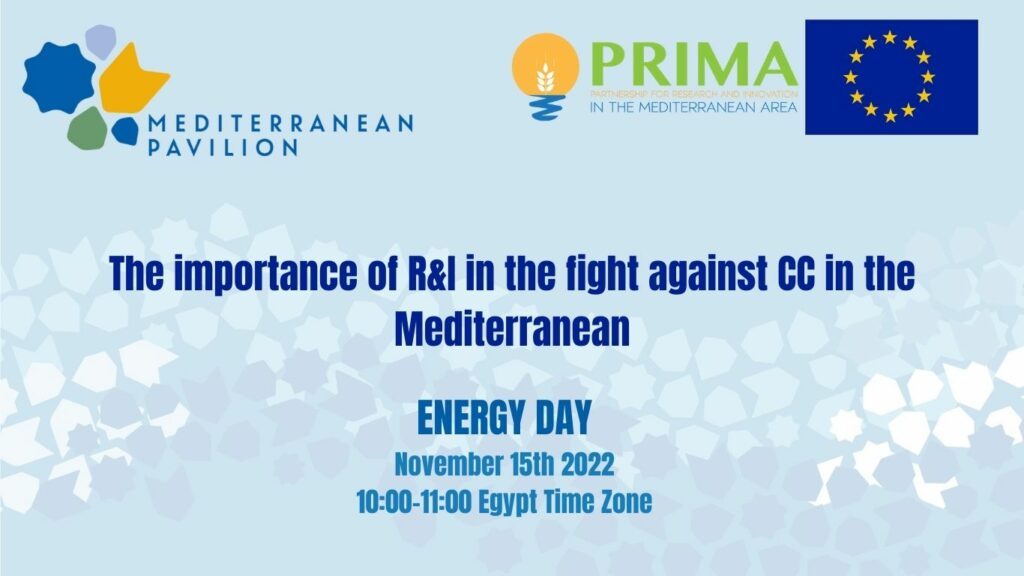
Lead organisation – PRIMA
Type of event– Hybrid panel debate
Background
The Mediterranean is one of the hotspots for CC. Its temperature increase is a 20% higher than the world average. CC has severe consequences such as rainfall decrease, increase of water demand, sea level increase, heavy storms, wildfires, to mention just a few. It has important impacts on agriculture, food security, health, social unrest and migrations.
To cope with these challenges, it is essential to understand how they are produced and which strategies work best in terms of mitigation and adaptation. It is also very relevant to predict when and where the extreme events will take place with as much anticipation as possible These strategies imply very often a change in individual and collective behavior and therefore to understand the incentives which work better and at the same time are feasible.
Knowledge is thus essential and the basis for all mitigation and adaptation measures. Actually, it means to develop robust systems of R&I without which measures and policies to mitigate and adapt to CC will not work. R&I have to encompass the biophysics of CC and also its socioeconomic impacts. Sectorial approaches are very limited because systems are complex and interrelated. Solutions to cope with CC need to be intersectoral across different disciplines and stakeholders.
These challenges are common to all the countries of the region and certainly no one can cope with them on its own. Countries around the Mediterranean are very diverse with huge differences in per capita GDP, population and scientific development but CC is a threat for them all. Cooperation among them is crucial not only to reach critical mass but also to test whether problems and solutions are similar or need to be adapted to different settings.
The EC and the UfM have developed a R&I Roadmap of three pillars CC, renewable energy and health. R&I on CC is certainly the core but renewable energy is closely related to CC and the region has a huge potential to develop it. Health will also be affected by CC even if less directly. It is a priority to develop and implement this roadmap in the next years to come.
PRIMA is an R&I program of 19 participating states around the Mediterranean, 11 from the EU and 8 non-EU which has been working since 2018. So far, it has funded 170 projects involving around 1700 teams from all the participating states. Its main areas are water, agriculture and food and their relations and links. CC is a transversal issue for most projects specially when they develop sustainable solutions.
PRIMA has shown to be a good broker allowing the cooperation of scientists and innovators from all participating states and has develop strong scientific networks around the Mediterranean. Knowledge is essential to understand CC and its implications and certainly to devise complex and difficult solutions. PRIMA can contribute to this difficult endeavor.
Moderator: Omar Amawi Deputy Deputy Director PRIMA
Speakers: Wolfgang Cramer, Chair of the MEDECC
Alvaro Albacete, Deputy SG of UfM
Octavi Quintana, Director, PRIMA
Clara de la Torre, Deputy DG CLIMA , European Commission
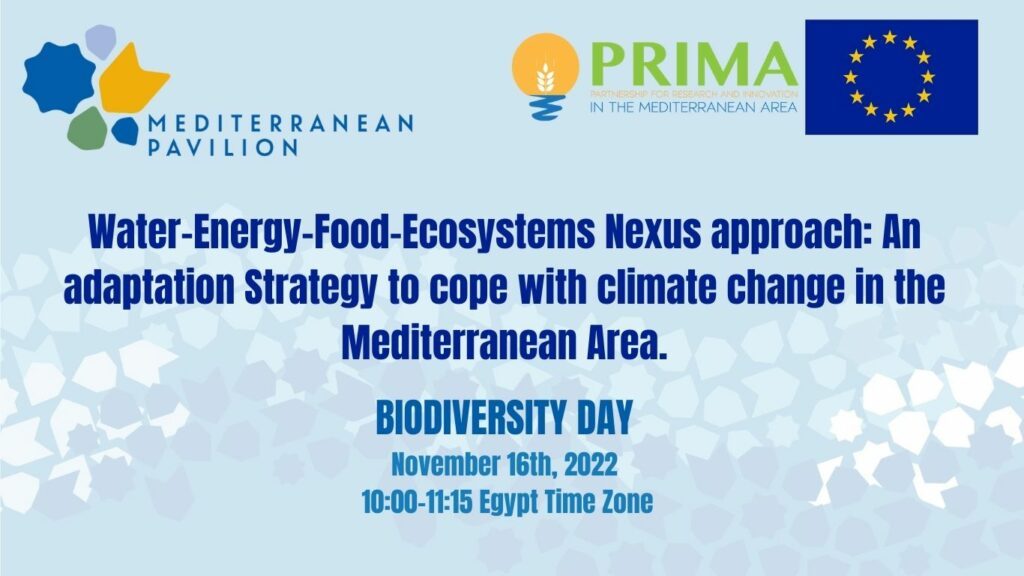
Lead organisation – PRIMA
Type of event– Hybrid panel debate
Background
Climate change affects the Mediterranean region significantly more than the world average, endangering the sustainable provision of water, energy, food, and ecosystem services. The region is more vulnerable to climate change impacts than other regions. Water scarcity will likely increase in the next decades because of climate change. Moreover, agricultural practices aimed at increasing yields have led to enhanced water use for irrigation. Continued intensification of agricultural practices will result in adverse consequences for water resources, biodiversity, and landscape functioning. This is combined with enhanced disturbances of environmental integrity, overexploitation of ecosystem services and a growing tendency towards desertification.
Mediterranean countries face a difficult challenge in meeting the growing demands for food, water, and energy, further compounded by climate change. Effective adaptation to change requires the efficient use of land, water, energy, and other vital resources and coordinated efforts to minimise trade-offs and maximise synergies. However, the policy process generally follows a sectoral approach that does not consider the interconnections and interdependence among the different sectors. The role of the water–food–energy nexus in addressing the competing demands of – and facilitating – adaptation and development has not yet been fully recognised.
Sectoral adaptation strategies can increase vulnerability or undermine net resilience by decreasing capacity or increasing risks in another place or sector, resulting in maladaptation. Most adaptation plans, including the National Adaptation Plans (NAPs), have been prepared to meet sectoral goals. They generally focus on sectoral and project-based activities without adequate consideration or coordination of cross-sectoral interactions among key climate-sensitive sectors such as water, energy, food, and ecosystems.
Event objectives
Considering that effective adaptation to change requires the efficient use of land, water, energy, and other vital resources and coordinated efforts to minimise trade-offs and maximise synergies, this event will be an opportunity for countries to raise awareness among policymakers, scientists, and local communities that the adaptation is closely linked with the sustainable use and management of water, energy and food, all of which are vital for sustainable development.
The event, aims to:
- Recognise the importance of the interlinkages in the water, energy, and food nexus and the implications for sustainable development and adaptation.
- The potential synergies and complementarities among the sectors should be used to guide the formulation of effective adaptation options
- Shift in policy approaches from a sectoral focus, which can result in competing and counterproductive actions, to an integrated approach with policy coherence among the sectors that use knowledge of the interlinkages to maximise gain, optimise trade-offs, and avoid negative impacts
- Recognise the importance of policies coherence which are a key to advancing toward sustainability
- Facilitate the Integration of the Nexus WEFE approach into National Adaptations Plans
Session coordinator Antonella Autino and Ali Rhouma PRIMA